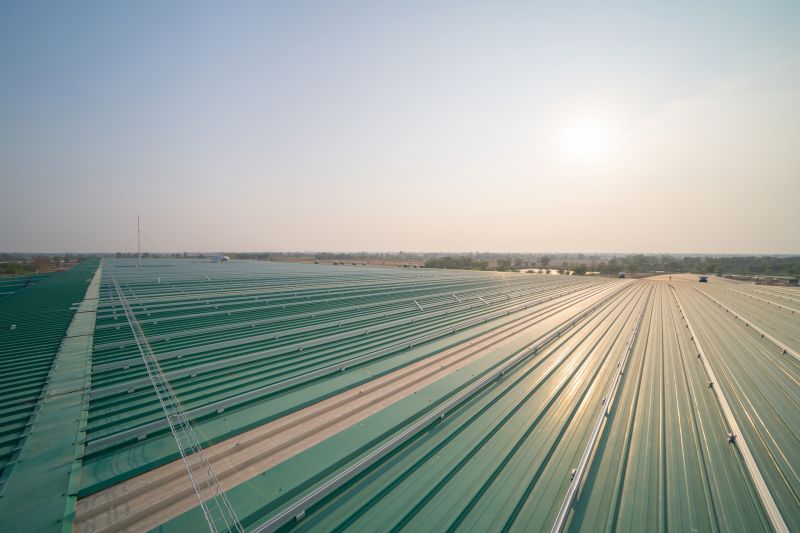Top-Rated Products For Roofing Service Projects
Browse a curated list of essential tools and materials that support successful roofing installations and repairs.
 In the realm of roofing services, selecting the right products is essential for ensuring the durability, safety, and longevity of roofing systems. From repair materials to maintenance tools, the variety of products available caters to different needs, whether for residential or commercial projects. Proper selection can facilitate efficient installation, effective repairs, and ongoing maintenance, ultimately contributing to the roof's performance over time.
In the realm of roofing services, selecting the right products is essential for ensuring the durability, safety, and longevity of roofing systems. From repair materials to maintenance tools, the variety of products available caters to different needs, whether for residential or commercial projects. Proper selection can facilitate efficient installation, effective repairs, and ongoing maintenance, ultimately contributing to the roof's performance over time.
Top Overall Option
Versatile Roofing Material System
A comprehensive roofing material system that includes durable shingles, reliable underlayment, and essential flashing components offers a flexible solution for various roofing projects. Designed for compatibility and ease of installation, this system supports both residential and commercial applications, providing a balanced combination of performance and versatility.
Types of Products For Roofing Service
Asphalt Shingles
Popular for their affordability and ease of installation, asphalt shingles come in various styles and colors suitable for many roofing designs.
Metal Roofing Panels
Known for their longevity and resistance to weather, metal panels are used in both residential and commercial roofing projects.
Roofing Underlayment
A critical layer beneath shingles or other roofing materials, underlayment provides additional waterproofing and protection against leaks.
Flashing Components
Metal or rubber flashing is used to seal joints and edges, preventing water infiltration around chimneys, vents, and skylights.
Sealants and Caulks
These products are essential for sealing gaps and joints to ensure a watertight roof surface.
Roofing Nails and Fasteners
Specialized nails and fasteners secure roofing materials firmly in place, designed to resist corrosion and weathering.
Roof Ventilation Products
Vents and ridge cap systems facilitate proper airflow, helping to regulate temperature and moisture levels within the attic space.
Gutters and Downspouts
These components channel water away from the roof and foundation, preventing water damage and erosion.
Roofing Tools
Specialized tools such as roofing nail guns, tear-off shovels, and measuring devices aid in efficient installation and repair.
Insulation Materials
Insulation helps improve energy efficiency and temperature regulation within the building structure.
Skylight Flashing Kits
Designed to seal around skylights, these kits prevent leaks and enhance the durability of skylight installations.
Roof Coatings
Protective coatings can extend the lifespan of roofing materials by providing additional weather resistance.
Emergency Leak Repair Kits
Portable kits equipped with sealants and patches for quick response to roof leaks.
Popular Choices
Enhanced aesthetic appeal with layered designs, suitable for various architectural styles.
A sleek metal roofing option featuring raised seams for durability and modern appearance.
Easy-to-install waterproof layers that adhere directly to roof decks, providing added leak protection.
Premium flashing material known for its corrosion resistance and aesthetic appeal.
Flexible sealants suitable for sealing around vents, chimneys, and flashing joints.
Fasteners designed to withstand harsh weather conditions and prevent rusting.
Mechanical ventilation solutions that enhance airflow and help regulate attic temperature.
Protect gutters from debris buildup, reducing maintenance needs.
Tools designed for removing old roofing materials efficiently during replacement projects.
Coatings that reflect sunlight, potentially reducing heat absorption in the building.
Electronic sensors that monitor roof integrity and alert homeowners to leaks early.
Roofing products encompass a broad spectrum, including various types of shingles, underlayment materials, flashing components, sealants, and specialized tools. Each product type is designed to address specific aspects of roofing, such as waterproofing, weather resistance, and structural integrity. When choosing these products, factors like compatibility with existing roofing materials, ease of application, and durability should be considered.
For professionals and DIY enthusiasts in Elgin, Illinois, understanding the differences among these products can help in making informed decisions. Quality roofing products not only improve the overall appearance of a roof but also provide critical protection against the elements. Proper maintenance and timely repairs using appropriate products can extend the lifespan of a roof and prevent costly damages.
Investing in the right roofing products involves evaluating the scope of the project, environmental conditions, and long-term performance expectations. Whether upgrading an existing roof or installing a new one, selecting suitable materials and tools is a vital step toward achieving a reliable and resilient roofing system. Consulting with local suppliers or roofing experts in Elgin can further assist in identifying the most suitable options for specific needs.
Key Buying Considerations
- Compatibility with existing roofing materials and structures.
- Durability and resistance to local weather conditions in Elgin, Illinois.
- Ease of installation, especially for DIY projects.
- Material lifespan and maintenance requirements.
- Weatherproofing and waterproofing capabilities.
- Compatibility with insulation and ventilation systems.
- Cost-effectiveness over the long term.
- Availability of replacement parts and accessories.
- Manufacturer reputation and product reviews.
- Warranty options and customer support.
- Environmental factors such as wind resistance and snow load capacity.
- Ease of transportation and handling of products.
- Local building codes and regulations compliance.
- Compatibility with architectural style and aesthetic preferences.
- Potential impact on energy efficiency and insulation.
